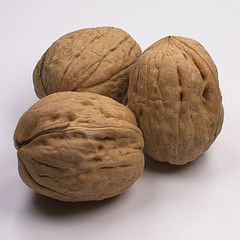
 Have you heard the buzz about nuts lately? Seems everyone’s suggesting them as the “new” good-for-you treat perfect for satisfying between-meal cravings. Here’s more promising news: Walnuts may help prevent breast cancer.
Have you heard the buzz about nuts lately? Seems everyone’s suggesting them as the “new” good-for-you treat perfect for satisfying between-meal cravings. Here’s more promising news: Walnuts may help prevent breast cancer.
Dr. Elaine Hardman presented the findings at the 100th Annual Meeting of the American Association for Cancer Research in April of this year (2009). She and her colleagues discovered that eating walnuts appeared to delay the onset of breast cancer in laboratory mice. Though experts warn that studies in mice don’t necessarily translate to humans, Hardman suggests that the omega-3 fatty acids, antioxidants, and phytosterols in walnuts may give humans similar benefits. “It is clear that walnuts contribute to a healthy diet that can reduce breast cancer,” she said.
The potential to fight cancer isn’t the only super-power in the walnut utility belt. A new study published in the American Journal of Clinical Nutrition found that eating a handful of whole walnuts a day lowered total cholesterol by 5.4 percent, and bad cholesterol by 9.3 percent. Research at the University of Texas Health Science Center showed that walnuts contain melatonin, a powerful antioxidant capable of stopping diseases like cancer, heart disease, and Alzheimer’s. Scientists speculate that the combination of melatonin and omega-3s starve cancer cells, and that the combination in walnuts may work better than consuming separate supplements of these nutrients.
Another study published in Clinical Cancer Research found that men with the highest intakes of omega-3s had a 63 percent lower risk of prostate cancer. In patients with type 2 diabetes, including a daily ounce of walnuts significantly improved cholesterol profile. This powerful food has also shown potential to prevent gallstones, help you get a better night’s sleep, maintain bone health, and lower the risk of weight gain-all when you eat just four walnuts a day! It can’t get easier than that. Even the bark and leaves of the walnut tree have been used to ease skin conditions like eczema.
What’s the secret? Walnuts contain the highest amount of omega-3 fatty acids of any other nuts. They’re great sources of vitamins E and B, magnesium, copper, and plant sterols. They also contain an antioxidant known as egallic acid, which helps prevent cancer cells from replicating. In fact, they’re so good for you that in 2003, the FDA allowed nut-producing companies to claim that their products may reduce the risk of heart disease.
Ready to add some of these gems to your daily diet? The key is moderation. Because walnuts are high in (good) fat and calories, it’s best for your waistline to limit your daily intake to about a handful. We love them in our salads, pizza, oatmeal and other cereals, yogurt, and sautéed vegetables. They’re also great for that mid-afternoon snack with a piece of fruit. Of course, walnuts are great in a myriad of recipes-you can find some healthy ideas at eatingwell.com.
How do you enjoy walnuts? Please share your great recipes with us!
Photo courtesy of funadium, via Flickr.com.

